The late Sara Carter was born 116 years ago today (read more)
|
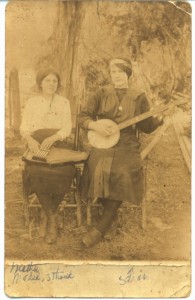 |
“Come Together” song by The Beatles written by John Lennon and credited to Lennon–McCartney. The song is the opening track on the album Abbey Road, and was released as a double A-sided single with “Something”, their twenty-first single in the United Kingdom and twenty-sixth in the United States. The song reached the top of the charts in the US, and peaked at number four in the UK. Read more about Come Together |
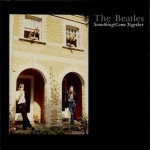 |
| Yusuf Islam (born Steven Demetre Georgiou, 21 July 1948), commonly known by his former stage name Cat Stevens, is an English singer-songwriter, multi-instrumentalist, educator, philanthropist, and prominent convert to Islam.
Stevens’ albums Tea for the Tillerman (1970) and Teaser and the Firecat (1971) were both certified triple platinum in the US by the RIAA. His 1972 album Catch Bull at Four sold half a million copies in the first two weeks of release alone and was Billboard’s number-one LP for three consecutive weeks. He also earned two ASCAP songwriting awards in consecutive years for “The First Cut Is the Deepest”; the song has been a hit single for four different artists. Some of his other hit songs are “Father and Son”, “Wild World”, “Peace Train”, “Moonshadow”, and “Morning Has Broken”. In December 1977, Stevens converted to Islam and adopted the name Yusuf Islam the following year. |
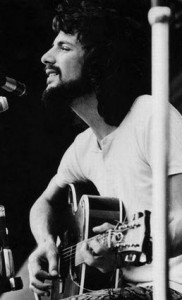 |
| Howard Norman “Howie” Epstein (July 21, 1955 – February 23, 2003) was a musician best known for his work with Tom Petty and theHeartbreakers as bassist.While playing on a Shannon album that Tom Petty was producing (Drop Down And Get Me), Epstein impressed Tom with his ability. So when Ron Blair, who had been bassist with Tom Petty and The Heartbreakers since their inception in 1976, announced that he had enough of touring, Epstein was recruited into the line-up. “We all kind of thought Howie would get the job,” says Heartbreakers’ drummer Stan Lynch. “He seemed to have a real good feeling for what we were doing. He’s a good bass player, a real good singer, and he fit in real well.” | 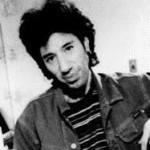 |
Spotify Playlist – July 21 |
|
Tag Archives: Beatles
The Beatles 40 best songs: at 20 Paperback Writer
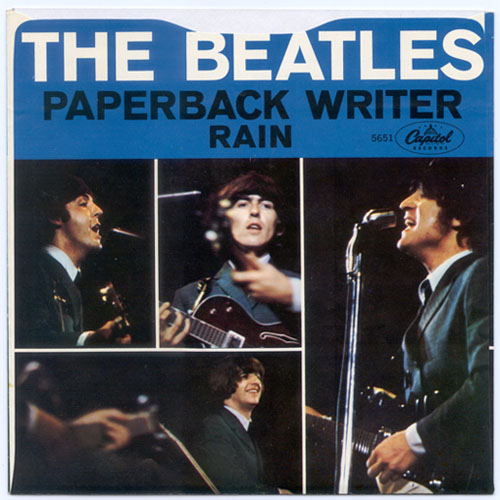
Paperback Writer was recorded between 13 and 14 April 1966. It was released 30 May 1966 (US) and 10 June 1966 (UK).
“I think I might have helped with some of the lyrics. Yes, I did. But it was mainly Paul’s tune.”
– John Lennon (Hit Parade in 1972)“Paperback Writer is son of Day Tripper, but it is Paul’s song. Son of Day Tripper meaning a rock ‘n’ roll song with a guitar lick on a fuzzy, loud guitar.”
– John Lennon (Playboy, 1980)“I took a bit of paper out and I said it should be something like ‘Dear Sir or Madam, as the case may be…’ and I proceeded to write it just like a letter in front of him, occasionally rhyming it. And John, as I recall, just sat there and said, ‘Oh, that’s it,’ ‘Uhuh,’ ‘Yeah.’ I remember him, his amused smile, saying, ‘Yes, that’s it, that’ll do.’ Quite a nice moment: ‘Hmm, I’ve done right! I’ve done well!’ And then we went upstairs and put the melody to it. John and I sat down and finished it all up, but it was tilted towards me, the original idea was mine. I had no music, but it’s just a little bluesy song, not a lot of melody. Then I had the idea to do the harmonies and we arranged that in the studio.”
– Paul McCartney (“Many years from now” by Barry Miles)
I love the sound on this single, Paperback Writer/Rain, the bass lines are incredible. The story according to Mark Lewisohn goes that it was John Lennon who demanded to know why the bass on a certain Wilson Pickett record far exceeded the bass on any Beatles records. This single certainly changed that.
“‘Paperback Writer’ was the first time the bass sound had been heard in all its excitement,” said Beatles’ engineer Geoff Emerick in Mark Lewisohn’s book The Complete Beatles Recording Sessions. “Paul played a different bass, a Rickenbacker. Then we boosted it further by using a loudspeaker as a microphone.
These are the probable credits:
- Paul McCartney – lead vocal, bass guitar
- John Lennon – backing vocal, rhythm guitar
- George Harrison – backing vocal, lead guitar
- Ringo Starr – drums, tambourine
The Beatles – Paperback Writer (promo):
Continue reading The Beatles 40 best songs: at 20 Paperback Writer
50 years ago today: A Hard Days Night by The Beatles was released
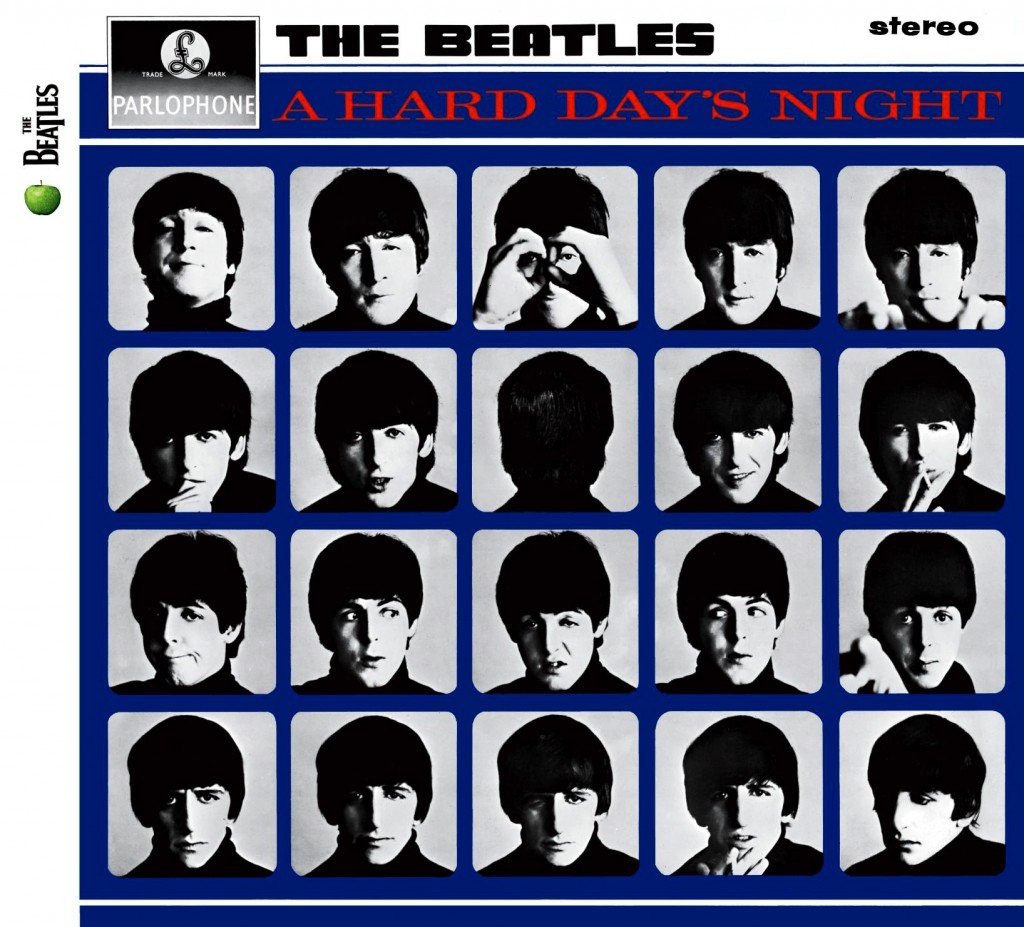
“We were different. We were older. We knew each other on all kinds of levels that we didn’t when we were teenagers. The early stuff – the Hard Day’s Night period, I call it – was the sexual equivalent of the beginning hysteria of a relationship. And the Sgt Pepper-Abbey Road period was the mature part of the relationship.”
– John Lennon (1980)
A Hard Day’s Night is the third album by The Beatles; it was released on July 10, 1964. The album is a soundtrack to the A Hard Day’s Night film, starring the Beatles. The American version of the album was released two weeks earlier, on 26 June 1964 by United Artists Records, with a different track listing. This is the first Beatles album to be recorded entirely on four-track tape, allowing for good stereo mixes.
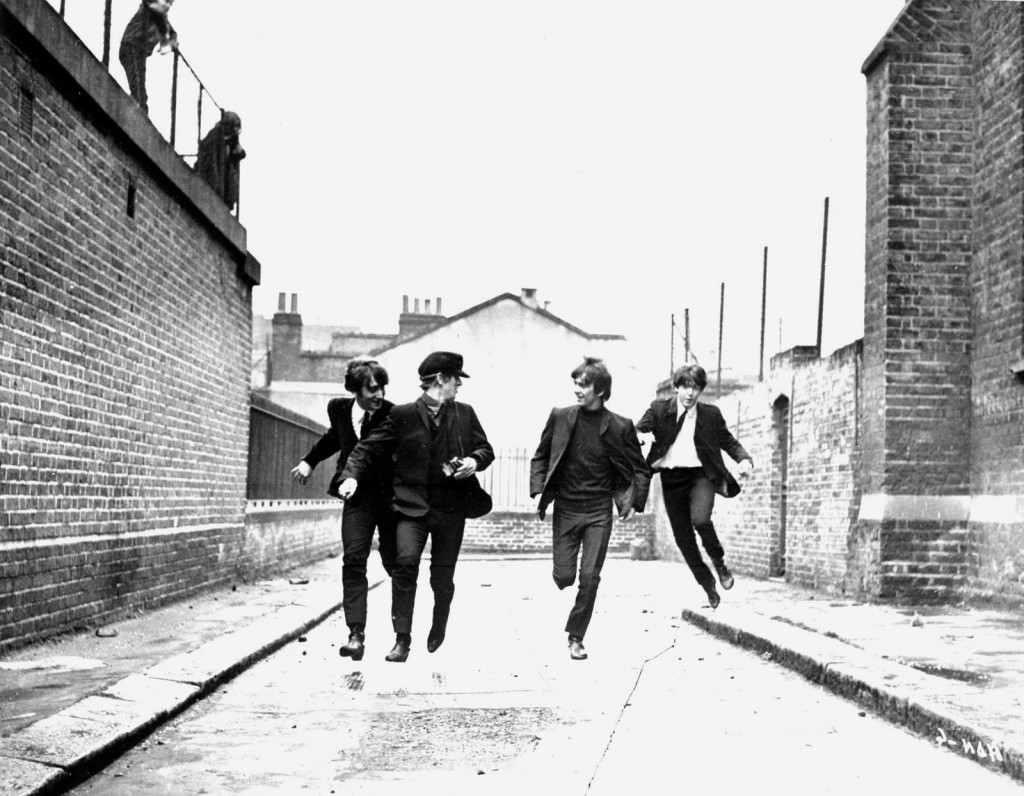
In 2000, Q placed A Hard Day’s Night at number 5 in its list of the 100 Greatest British Albums Ever. In 2003, the album was ranked number 388 on Rolling Stone magazine’s list of the 500 Greatest Albums of All Time.
The soundtrack songs were recorded in late February, and the non-soundtrack songs were recorded in June. The title song itself was recorded on April 16.
“…but A Hard Day’s Night is perhaps the band’s most straightforward album: You notice the catchiness first, and you can wonder how they got it later.
The best example of this is the title track– the clang of that opening chord to put everyone on notice, two burning minutes thick with percussion (including a hammering cowbell!) thanks to the new four-track machines George Martin was using, and then the song spiraling out with a guitar figure as abstractedly lovely as anything the group had recorded.”
– Tom Ewing, Pitchfork
Continue reading 50 years ago today: A Hard Days Night by The Beatles was released
The Beatles 40 best songs: at 24 “Help!”
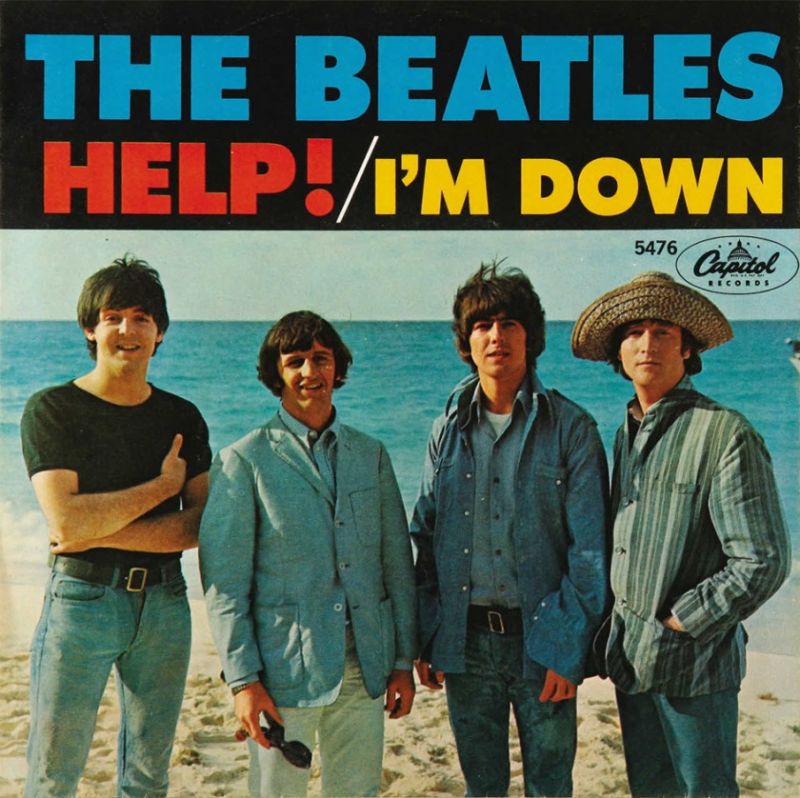
“The whole Beatles thing was just beyond comprehension. I was subconsciously crying out for help”.
– John Lennon (1980)
Help! is a song by the Beatles that served as the title song for both the 1965 film and its soundtrack album. It was also released as a single, and was number one for three weeks in both the United States and the United Kingdom.
Help! was mainly written by John Lennon, but credited to Lennon–McCartney.
“I seem to remember Dick Lester, Brian Epstein, Walter Shenson and ourselves sitting around, maybe Victor Spinetti was there, and thinking, What are we going to call this one? Somehow Help! came out. I didn’t suggest it; John might have suggested it or Dick Lester. It was one of them. John went home and thought about it and got the basis of it, then we had a writing session on it. We sat at his house and wrote it, so he obviously didn’t have that much of it. I would have to credit it to John for original inspiration 70-30. My main contribution is the countermelody to John.”
– Paul McCartney (Paul McCartney: Many Years From Now)
The Beatles – Help! (live):
June 4 in music history
30 year anniversary for Bruce Springsteen’s Born in the USA (read more)Born in the U.S.A. is the seventh studio album by Bruce Springsteen, it was released on June 4, 1984. A critical and commercial triumph, it found Springsteen marking a departure in his sound. While the predecessor, the dark and acoustic Nebraska featured songs of pessimism and isolation, Born in the U.S.A.’s lyrics expressed signs of hope in the daily fight of the standard American in following the American Dream, a new feeling complemented by synthesized arrangements and a pop-flavored, radio-oriented sound that helped Springsteen to extend his popularity and appeal to mainstream audiences. |
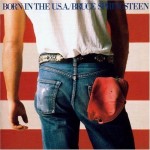 |
45 year anniversary for Johnny Cash’s Live at San Quentin (read more)At San Quentin is the 31st overall album and a recording of a live concert given by Johnny Cash to the inmates of San Quentin State Prison. As well as being released on record the concert was filmed by Granada Television. The album was a follow-up to Cash’s previous live album, the critically acclaimed and commercially successful At Folsom Prison. On the original LP release, the song order was changed and several songs were cut, probably for space reasons. Despite the title of the version released on CD in 2000 – At San Quentin (The Complete 1969 Concert) – the CD does not contain the entire concert uncut, but does feature additional tracks and running order that parallels the actual set list. |
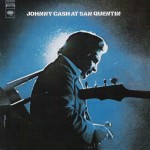 |
“The Ballad of John and Yoko” released Jun 4, 1969, in the US (May 30 in the UK)a song written by John Lennon, attributed to Lennon–McCartney as was the custom, and released by the Beatles as a single in May 1969. The song, chronicling the events surrounding Lennon’s marriage to Yoko Ono, was the Beatles’ 17th and final UK number one single The song was recorded without George Harrison (who was on holiday) and Ringo Starr (who was filming The Magic Christian). In his biography, McCartney recalls that Lennon had a sudden inspiration for the song and had suggested that the two of them should record it immediately, without waiting for the other Beatles to return. Reflecting this somewhat unusual situation, the session recordings include the following exchange:
|
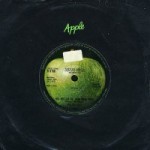 |
Kasey Chambers (born 4 June 1976)Australian country singer-songwriter. She is the daughter of steel guitar player Bill Chambers, and the sister of musician and producer Nash Chambers. Chambers was born in Mount Gambier, South Australia. She grew up on the Nullarbor Plain where her family lived seven to eight months a year until 1986. In late 2005, Chambers married Australian singer-songwriter Shane Nicholson. |
 |
Oliver Edward Nelson (June 4, 1932 in St. Louis, Missouri – October 28, 1975)American jazz saxophonist, clarinetist,arranger and composer.Oliver Nelson was a distinctive soloist on alto, tenor, and even soprano, but his writing eventually overshadowed his playing skills. He became a professional early on in 1947, playing with the Jeter-Pillars Orchestra and with St. Louis big bands headed by George Hudson and Nat Towles. In 1951, he arranged and played second alto for Louis Jordan‘s big band, and followed with a period in the Navy and four years at a university. After moving to New York, Nelson worked briefly with Erskine Hawkins, Wild Bill Davis, and Louie Bellson (the latter on the West Coast). In addition to playing with Quincy Jones’ orchestra (1960-1961), between 1959-1961 Nelson recorded six small-group albums and a big band date; those gave him a lot of recognition and respect in the jazz world. Blues and the Abstract Truth (from 1961) is considered a classic and helped to popularize a song that Nelson had included on a slightly earlier Eddie “Lockjaw” Davis session, “Stolen Moments.” He also fearlessly matched wits effectively with the explosive Eric Dolphy on a pair of quintet sessions. But good as his playing was, Nelson was in greater demand as an arranger, writing for big band dates of Jimmy Smith, Wes Montgomery, and Billy Taylor, among others. By 1967, when he moved to Los Angeles, Nelsonwas working hard in the studios, writing for television and movies. He occasionally appeared with a big band, wrote a few ambitious works, and recorded jazz on an infrequent basis, but Oliver Nelson was largely lost to jazz a few years before his unexpected death at age 43 from a heart attack. |
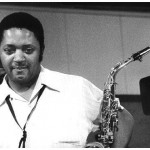 |
James ‘Jimmy’ McCulloch (4 June 1953 – 27 September 1979)Scottish musician and songwriter best known for playing lead guitar in Paul McCartney’s Wings from 1974 to 1977. McCulloch was a member of the Glasgow psychedelic band One in a Million (formerly known as The Jaygars), Thunderclap Newman, and Stone the Crows.[1] He also made appearances on many albums, including John Entwistle’s Whistle Rymes in 1972, as lead guitarist playing alongside Peter Frampton on “Apron Strings” and “I Feel Better”; and onRoy Harper’s album, Bullinamingvase, and Ricci Martin’s album, Bleached, both in 1977. McCulloch also played guitar on Roger Daltrey’s album One of the boys which was released in 1977. McCulloch was a friend of The Who and a member of the band Thunderclap Newman, which was created and produced by his mentor Pete Townshend.
|
 |
Ronald Frederick “Ronnie” Lane (1 April 1946 – 4 June 1997)English musician, songwriter, and producer who is best known as the bass guitarist and founding member of two prominent English rock and roll bands: Small Faces where he was nicknamed “Plonk” (1965–69), and, after losing the band’s frontman, Faces, with two new members added to the line-up, (from the Jeff Beck Group), who dubbed him “Three-Piece” (1969–73). It was for his work in both Small Faces and Faces that Lane was inducted posthumously into theRock and Roll Hall of Fame in 2012. Subsequently Lane collaborated with other musicians, leading his own bands as well as pursuing a solo career while remaining close to his former bandmates. In the late 1970s he was diagnosed with multiple sclerosis and, despite charity projects and financial support from friends, former bandmates and fans, Lane, after suffering from the disease for 21 years, died at 51. |
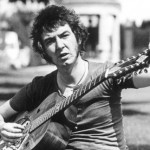 |
Spotify Playlist – June 4: |
|
